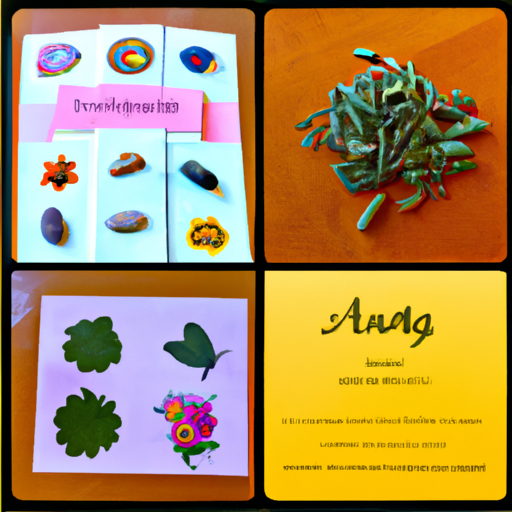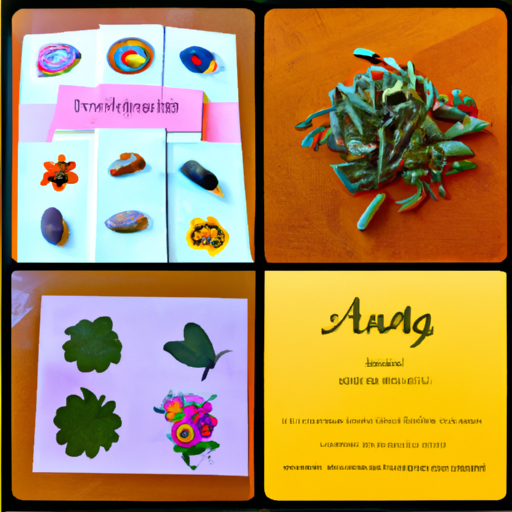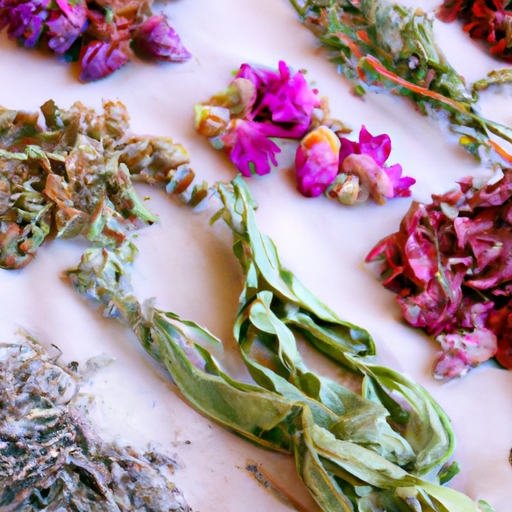Have you ever experienced moments of anxiety? You know, those times when your heart races and your mind feels like it’s on overdrive? It can be a really overwhelming feeling. But here’s the thing, there are natural remedies out there that can help ease those anxious moments. Specifically, there are certain herbs that have been shown to be effective in reducing anxiety symptoms. In fact, in this article, you’ll discover some of these herbs and how they can be beneficial for you.
Now, let’s talk about these herbs in a conversational manner. One herb that has gained popularity for its calming properties is chamomile. You might already be familiar with chamomile tea, but did you know that it has been used for centuries to relax the mind and promote sleep? Yes, it’s true! This herb contains compounds that bind to certain receptors in your brain, helping to reduce anxiety and induce a sense of calmness. So, the next time you’re feeling anxious, sip on a warm cup of chamomile tea and let its soothing effects work their magic. But wait, there’s more! In addition to chamomile, there are other herbs like lavender, lemon balm, and valerian root that can also help alleviate anxiety. Intrigued? Well, keep reading to learn more about these amazing herbs and how you can incorporate them into your daily routine.
What is anxiety?
Anxiety is a common mental health condition that can affect anyone at any age. It is characterized by excessive worry, fear, and a sense of impending doom. While it’s normal to feel anxious in certain situations, such as before a big test or presentation, anxiety becomes a problem when it starts interfering with your daily life.
Differentiating normal worry from anxiety
It’s important to distinguish between normal worry and anxiety. Worry is a natural response to certain stressors, and it can even be helpful in certain situations. Anxiety, on the other hand, is often irrational and out of proportion to the actual situation. If you find yourself constantly worrying, experiencing physical symptoms such as a racing heart or trouble sleeping, and it’s affecting your ability to function, it may be a sign of anxiety.
Physical and psychological symptoms of anxiety
Anxiety can manifest in both physical and psychological symptoms. Common physical symptoms include rapid heartbeat, sweating, shaking, shortness of breath, nausea, and fatigue. Psychological symptoms may include excessive worry, restlessness, irritability, difficulty concentrating, and sleep disturbances. If you’re experiencing any of these symptoms on a regular basis, it’s important to seek help from a healthcare professional.
Traditional herbs used for anxiety relief
In addition to seeking professional help, some people turn to traditional herbal remedies to help alleviate their anxiety symptoms. While not a substitute for medical treatment, these herbs have been used for centuries and may provide some relief. Here are four popular herbs that are known for their calming effects:
Lavender
Lavender is perhaps one of the most well-known and widely used herbs for anxiety relief. It has a gentle, soothing scent that can induce feelings of calmness and relaxation. Lavender is thought to work by interacting with receptors in the brain to promote a sense of tranquility. In addition to anxiety, lavender may also help with insomnia and restlessness.
Passionflower
Passionflower is another herb that has been used for centuries to help with anxiety. It is believed to increase the levels of a neurotransmitter called gamma-aminobutyric acid (GABA) in the brain, which has a calming effect. Passionflower may also help improve sleep quality and reduce symptoms of irritability and agitation.
Chamomile
Chamomile is a popular herb known for its calming properties. It contains compounds that can bind to the same receptors in the brain as certain anti-anxiety medications, such as benzodiazepines. Chamomile tea is a common way to consume this herb, and it is often used to promote relaxation and improve sleep.
Valerian root
Valerian root is a herb that has been used for centuries to promote relaxation and sleep. It is believed to work by increasing the levels of a neurotransmitter called gamma-aminobutyric acid (GABA) in the brain. Valerian root is often used as a natural alternative to sleeping pills and may help reduce anxiety symptoms as well.
How lavender can help with anxiety
Lavender is known for its calming and relaxing properties. It has been used for centuries as a natural remedy for anxiety and has gained popularity in recent years. Lavender contains several compounds, including linalool and linalyl acetate, which have been shown to have anxiety-reducing effects.
Properties and benefits of lavender
Lavender has a distinct floral scent that is often used in aromatherapy to induce relaxation. Inhaling the scent of lavender can help reduce anxiety and promote a sense of calmness. Lavender may also help improve sleep quality and reduce symptoms of insomnia. Some research suggests that lavender may even have a positive effect on the nervous system, helping to reduce feelings of stress and anxiety.
Methods of using lavender for anxiety relief
There are several ways you can use lavender for anxiety relief. One popular method is to use lavender essential oil in a diffuser or bath. The scent of lavender can help calm your mind and body. You can also apply lavender essential oil directly to your skin, such as on your wrists or neck. Another option is to drink lavender tea, which can have a soothing effect on both the mind and body.
The calming effects of passionflower
Passionflower is a herb that is often used to help reduce symptoms of anxiety and promote relaxation. It has been used for centuries for its calming effects and is believed to work by increasing the levels of GABA in the brain.
Properties and benefits of passionflower
Passionflower contains flavonoids and alkaloids that have been shown to have anxiety-reducing effects. It can help calm the mind and body, reduce feelings of restlessness and irritability, and promote a sense of tranquility. Passionflower may also help improve sleep quality and reduce symptoms of insomnia.
Recommended dosage and usage of passionflower for anxiety relief
The appropriate dosage of passionflower for anxiety relief can vary depending on the individual. It is always best to start with a lower dosage and gradually increase it as needed. Passionflower can be taken in various forms, including as a tea, tincture, or supplement. It is important to follow the instructions on the product label or consult with a healthcare professional for guidance on dosage and usage.
Chamomile as a natural anxiety remedy
Chamomile is a herb that has been used for centuries for its calming and soothing properties. It is often consumed as a tea and has a mild, floral taste.
Properties and benefits of chamomile
Chamomile contains several compounds, including apigenin, which has been shown to have anti-anxiety effects. It can help reduce feelings of stress, promote relaxation, and improve sleep quality. Chamomile is also known for its anti-inflammatory and antioxidant properties, which may have additional health benefits.
Different forms of chamomile for alleviating anxiety symptoms
Chamomile can be consumed in various forms to help alleviate anxiety symptoms. Chamomile tea is a popular choice and can be enjoyed hot or cold. You can also find chamomile supplements or tinctures, which can be taken orally. Some people even use chamomile essential oil in aromatherapy or as a topical treatment for anxiety.
Valerian root for relaxation and sleep
Valerian root is a herb that is often used as a natural remedy for anxiety, relaxation, and sleep. It has been used for centuries for its sedative properties.
Properties and benefits of valerian root
Valerian root contains several compounds, including valerenic acid, which have been shown to have calming and sedative effects. It is believed to increase the levels of GABA in the brain, which can help promote relaxation and reduce anxiety symptoms. Valerian root may also help improve sleep quality and reduce symptoms of insomnia.
Safety precautions and potential side effects of valerian root
While valerian root is generally considered safe for most people, it can cause drowsiness, dizziness, and stomach upset in some individuals. It is important to start with a low dosage and gradually increase it as needed. Valerian root should not be used for an extended period without consulting with a healthcare professional. Additionally, it is not recommended for use in pregnant or breastfeeding women.
Combining herbs for enhanced anxiety relief
For some individuals, combining different herbs can provide enhanced anxiety relief. Some herbs work synergistically together, complementing each other’s effects and maximizing their benefits.
Synergistic effects of combining lavender, passionflower, chamomile, and valerian root
The combination of lavender, passionflower, chamomile, and valerian root can have a powerful calming effect on the mind and body. Lavender provides a soothing scent, passionflower increases GABA levels, chamomile reduces stress, and valerian root promotes relaxation and sleep. Together, these herbs can help reduce anxiety symptoms and provide a sense of peace and tranquility.
Recommended ratios and strategies for combining these herbs
The optimal ratios and strategies for combining these herbs may vary depending on the individual and their specific needs. It is best to consult with a healthcare professional or a qualified herbalist for guidance on combining herbs. They can help determine the appropriate dosages and frequencies to ensure that you’re getting the most benefit from each herb.
Alternative herbs for anxiety relief
In addition to lavender, passionflower, chamomile, and valerian root, there are other herbs that have been used for anxiety relief.
Lemon balm
Lemon balm is a herb that is often used to reduce feelings of stress and anxiety. It has a mild, lemony scent and taste and can help promote relaxation and improve sleep quality.
Kava
Kava is a herb that is native to the South Pacific islands. It has been used for centuries for its calming and relaxing properties. Kava is believed to work by increasing GABA levels in the brain, similar to passionflower and valerian root.
Rhodiola rosea
Rhodiola rosea is an herb that is often used to help reduce symptoms of stress and anxiety. It is believed to work by regulating the release of stress hormones in the body and promoting a sense of calmness.
Lifestyle changes to complement herbal remedies
In addition to herbal remedies, making certain lifestyle changes can also help alleviate anxiety symptoms. Here are a few suggestions:
Healthy diet and exercise
A healthy diet and regular exercise can have a positive impact on your mental health. Eating a balanced diet that includes fruits, vegetables, whole grains, and lean proteins can help support brain health. Regular exercise, such as walking, jogging, or yoga, can help reduce stress and promote feelings of well-being.
Stress management techniques
Stress management techniques, such as deep breathing exercises, meditation, and mindfulness practices, can help calm the mind and reduce anxiety. Finding activities that you enjoy and that help you relax, such as reading, listening to music, or spending time in nature, can also be beneficial.
Sleep hygiene practices
Getting enough quality sleep is essential for managing anxiety. Establishing a consistent sleep schedule, creating a relaxing bedtime routine, and creating a comfortable sleep environment can all contribute to better sleep quality. Avoiding stimulants, such as caffeine and electronics, before bed can also help promote a good night’s sleep.
Conclusion
Natural remedies, such as herbs, can be a valuable addition to your anxiety management toolkit. Lavender, passionflower, chamomile, and valerian root are just a few herbs that have been used for centuries to help alleviate anxiety symptoms. Remember, it’s important to consult with a healthcare professional before starting any herbal remedies and to use them in conjunction with other treatment options. By exploring different herbs and making lifestyle changes, you can find what works best for you in managing your anxiety.


